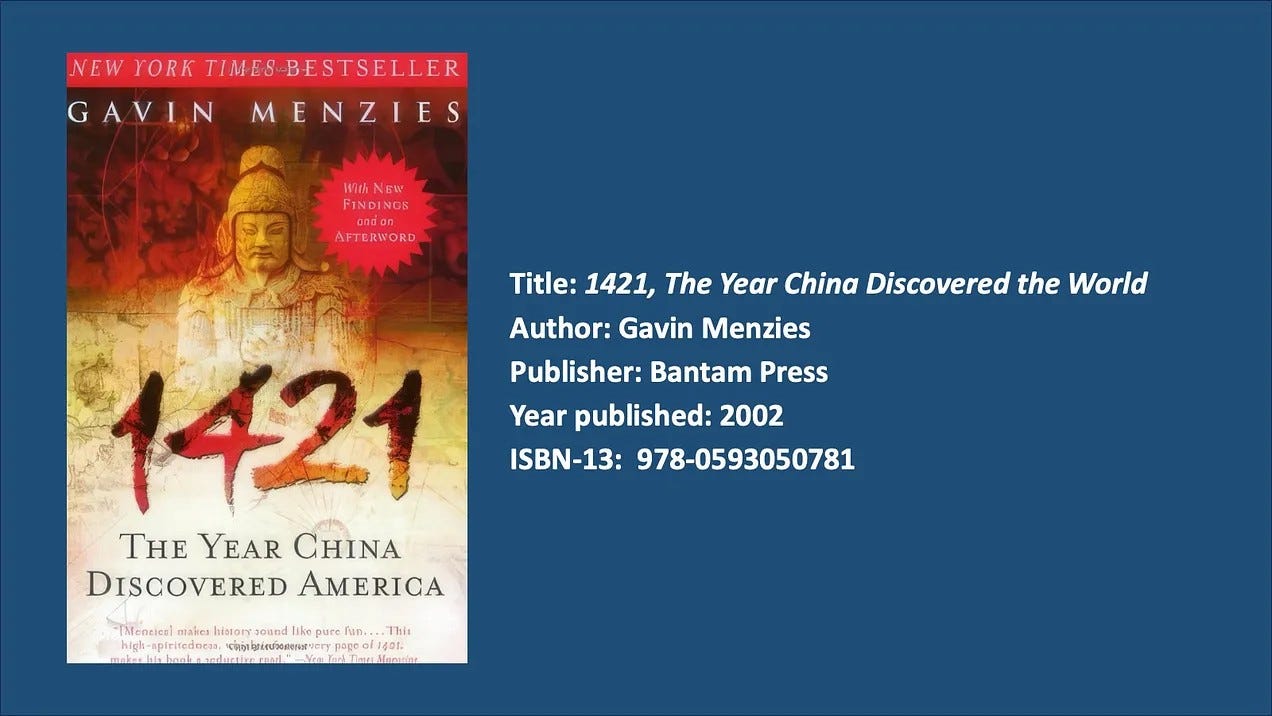GAVIN MENZIES’ 1421: The Year China Discovered the World presents a bold and controversial thesis — that Chinese explorers, led by Admiral Zheng He, discovered the Americas, Australia, and even circumnavigated the globe decades before Columbus, Magellan, or other European explorers. Using a mix of historical records, maps, and speculative evidence, Menzies (1937-2020) constructs a narrative that challenges conventional accounts of world history. While the book is engaging and thought-provoking, it has also drawn significant criticism from historians and scholars for its speculative claims.
** SALUTING THE LEGEND. Click here to read our editorial and links to the main stories of the NAC Focus on Zheng He
Menzies, a retired British submarine commander, argues that during the Ming Dynasty, Emperor Zhu Di launched a massive naval expedition between 1421 and 1423. According to the book, Zheng He’s fleet and its subsidiary expeditions travelled across the Pacific, reached the Americas before Columbus, mapped Antarctica, and explored Australia. The book suggests that after these voyages, China entered a period of isolationism, leading to the loss of these discoveries in official records, allowing Europeans to claim the credit in later centuries.
One of the book’s strongest aspects is its storytelling. Menzies writes with enthusiasm and a sense of adventure, making the narrative accessible to a broad audience. He draws from various sources, including old maps, shipwrecks, and cultural artefacts, to support his argument. His descriptions of the grandeur of China’s early 15th-century naval power highlight how advanced the Ming Dynasty’s maritime capabilities were as compared to contemporary European powers.
However, Menzies’ claims are largely speculative and lack solid historical backing. Professional historians have pointed out numerous flaws in his arguments. Many of the maps and artefacts he cites as evidence have been debunked or interpreted differently by experts. Additionally, there is no conclusive Chinese record of such extensive global voyages. While it is true that Zheng He led remarkable expeditions across the Indian Ocean and as far as the east coast of Africa, there is little evidence that his fleet — or any Chinese expeditions — reached the Americas or Australia before European explorers.
##CROSSOVER: Click here to read our main story, Zheng He: The forgotten discoverer of America?, at www.newasiacurrents.com
Menzies frequently presents theories as facts, leading to skepticism among historians. For example, he argues that Chinese influence can be seen in pre-Columbian American cultures, but his assertions are largely based on coincidences rather than documented historical interactions.
Despite its academic shortcomings, 1421 has been influential in popular history, sparking discussions about China’s role in early global exploration. The book encourages readers to question Eurocentric narratives and consider the possibility of alternative histories. While Menzies’ conclusions are highly disputed, his work has inspired interest in Chinese maritime history and Zheng He’s expeditions.
In conclusion, 1421: The Year China Discovered the World is an engaging and provocative book that challenges mainstream historical accounts. While Menzies raises interesting possibilities, his arguments need more definitive evidence to strengthen his case. Readers interested in historical mysteries and revisionist theories may find it a fascinating read. - Lin Siu-loong
This article was published in PostScript NAC on April 1, 2025.
Click here to view the programme for the conference on Voyages@Frontiers of New Asia of the Commonwealth of World Chinatowns (CWC), Sept 3-8, 2025, Jen Hotel, Penang, Malaysia
All articles, opinions, and events featured in NAC Focus represent the views of the interviewees, individual writers and contributors, and do not necessarily reflect those of NAC Focus. While we strive to ensure all information on this post is accurate, complete, and current, NAC Focus is not responsible for any errors, omissions, or outdated content.


